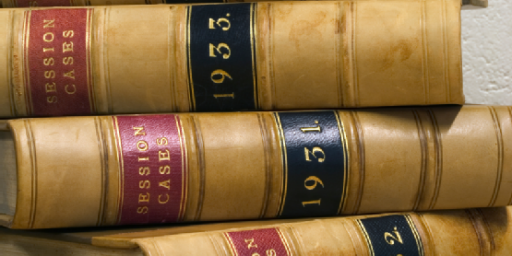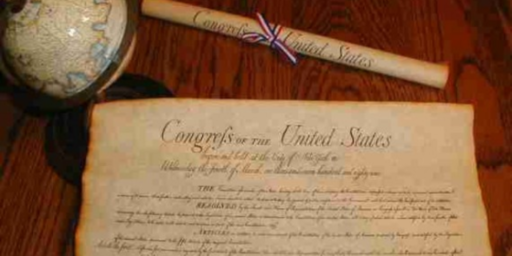Judge Rules That What You Post On Facebook Can Be Used As Evidence Against You
As far as the law is concerned, your social media accounts aren't private at all.
A U.S. District Court Judge in New York City has issued a ruling that, when you really think about it, should be rather blindingly obvious:
Did you know that what you say on Facebook can be used against you in a court of law? If you’re sharing something with your friends, you may as well be sharing directly with the judge and jury: A recent ruling in a U.S. federal court says that if you post something on Facebook, your friend can share that information with the police — it’s not a violation of your privacy.
Accused gang member Melvin Colon had argued in court that investigators violated his constitutional right to privacy when they viewed his Facebook profile via one of his friends’ accounts. But US District Judge William Pauley III ruled that Colon’s messaged threats and posts about violent acts he committed were not private, and indeed fair game for prosecutors. To some extent, the ruling makes logical sense: When you say something publicly on Facebook, you’re often sharing a thought with hundreds, maybe even thousands of people. There’s not much that’s private about that.
No, there’s not, what you post on Facebook, or Twitter, or any other social networking site is considered publicly disseminated for the purposes of the law even if you have restricted access to your account to only a select group of people. It’s the same situation, essentially, as if you were having a conversation with a group of your friends in your home and one of those friends went to the police and reported that you confessed to a crime. In this particular case, it appears that what happened is that the police had obtained the cooperation of one of Colon’s co-conspirators in the case at hand, who also happened to be on of his Facebook friends and, as part of convincing that person to become a cooperating witness (no doubt in exchange for lower charges or a lighter sentence as is common in these situations) they required him to let the police use his Facebook account to see what Colon was posting. When they saw that Colon was posting about the acts he’d committed in the case at issue, along with other violent acts, they applied for a Search Warrant to be served on Facebook, with the probable cause being what they had seen during the course of their investigation.
The primary objection posed by Colon’s attorney’s went not to the Search Warrant served upon Facebook, which they conceded was validly issued, but the method by which law enforcement went about establishing the necessary probable cause. However, as the Judge in this case correctly held, the method that the government used to obtain information was entirely proper given the fact that Colon had no expectation of privacy in his Facebook posts:
Colon maintained a Facebook profile in which he pennitted his Facebook ”friends” to view a list of all of his other Facebook “friends,” as well as messages and photographs that Colon and others posted to Colon’s profile. (See Def.’s Mem. of Law, Ex. F:Affidavit in Support of Facebook Search Warrant (“Facebook Aff.”) at 8-9.) The Government viewed Colon’s Facebook profile through the Facebook account of one of Colon’s “friends” who was a cooperating witness. (See Facebook Aff. at 16.) By that means, the Government learned, inter alia, that Colon posted messages regarding prior acts of violence, threatened new violence to rival gang members, and sought to maintain the loyalties of other alleged members of Colon’s gang. (See Facebook Aff. at 19.) Access to Colon’s Facebook profile fonned the core of the Government’s evidence of probable cause supporting its application for the search warrant.
Where Facebook privacy settings allow viewership of postings by “friends,” the Government may access them through a cooperating witness who is a “friend” without violating the Fourth Amendment. Cf. United States v. Barone, 913 F.2d 46,49 (2d Cir. 1990) (finding that a person does not have a legitimate privacy expectation in telephone calls recorded by the Government with the consent of at least one party on the call.) While Colon undoubtedly believed that his Facebook profile would not be shared with law enforcement, he had no justifiable expectation that his “friends” would keep his profile private. Cf. Barone, 913 F.2d at 49. And the wider his circle of “friends,” the more likely Colon’s posts would be viewed by someone he never expected to see them. Colon’s legitimate expectation of privacy ended when he disseminated posts to his “friends” because those “friends” were free to use the information however they wanted-including sharing it with the Government. Cf. Guest, 255 F.3d at 333 (finding that an e-mail sender-like a letter writer-loses their expectation of privacy upon delivery). When Colon posted to his Facebook profile and then shared those posts with his ”friends,” he did so at his peril. Because Colon surrendered his expectation of privacy, the Government did not violate the Fourth Amendment when it accessed Colon’s Facebook profile through a cooperating witness.
I’ve seen several comments by people expressing concern about this decision, but it seems pretty elementary to me. One of the core tests of any claim that the 4th Amendment has been violated in a particular case is the question of whether the Defendant had a reasonable expectation of privacy in the information or item that was obtained as a result of the search. That applies as equally to the information you post online as it does to the duffle bag you placed on the back seat of your friends car, and in the case of things you post on a public network like Facebook it’s simply illogical to say that you have a reasonable expectation of privacy in information or photographs that you are freely sharing with a group of people, even if you’ve taken steps to make sure that only that group of people can see what you post. In this case, the police did nothing wrong in using the Facebook account of one of Colon’s friends to examine what he’d been posting, and as soon as they determined he was posting information that incriminated him, they applied for a Search Warrant.
Some people who have talked about this case since the decision was handed down have wondered what happens if someone’s Facebook account has been hacked and incriminating information posted there under their name. This isn’t an unwarranted concern, but I would submit it is hardly a reason to bar law enforcement from ever gaining access to a social media account if they have probable cause to support their warrant. The obvious solution to a situation such as this is that the defense would be able to seek to suppress the evidence based on fabrication, as long as they can prove that such a thing happened. If they’re unable to suppress the evidence, then they are free to present evidence at trial questioning the credibility of the evidence. This is what the adversarial process is all about.
The lesson here is very simply. Once you post something online then it can be subject to being admitted into evidence in any court proceeding you’re involved in, criminal or civil, so perhaps next time people won’t be as stupid as Mr. Colon apparently was when he essentially confessed to multiple crimes on his Facebook page.
Here’s the opinion:







If someone hacked your Facebook page–or website, or Twitter account, or whatever–and, posing as you, confessed to a crime, could that be traceable through technical means such as the ISP of the hacker? I ask because I don’t know enough about the technology of hacking to say.
The Internet is the widest and most intentional ceding of privacy rights by individuals … ever.
I assume that anything (everything) I post on the internet is public or very possibly public. God bless the Electronic Frontier Foundation and their efforts. I’m not sure where all of this is going, but I’m not optimistic.
@CSK:
It’s possible, assuming that Facebook holds onto the originating IP. (And they most likely do.) That said, I can think of several scenarios right off the top of my head where I could post to your Facebook account from an IP that you own, so don’t necessarily count on that as a defense.
@Al:
Thanks for the info.
I’ve often wondered how social media such as Facebook will affect the interpretation of at least one aspect of First Amendment law, specifically that relating to libel. It’s my understanding that if a private citizen is falsely and publicly accused of a crime, or of being mentally ill, he or she has a pretty good libel case against the accuser, since being accused of being a criminal or of being a crazy are the two things most likely to damage your reputation, which the courts regard as a tangible asset. Of course you have to prove that you’ve suffered financially from the accusation, and not just that your feelings have been hurt.
Will people who put their lives on Facebook for all the world to see someday be considered public figures and not private figures, and thus afforded less protection against slander and libel?
@CSK:
That’s an interesting question, I don’t think a court has had to deal with it yet but I’m sure it won’t be long before some court somewhere will be asked to do so.
IANAL, but actually hacking someone’s FB or other social media accounts (as opposed to taking advantage of someone leaving himself logged in or something) should be covered by laws preventing “unauthorized access” of computers / accounts / etc., no? Like 18 USC 1030?
@Rick Almeida: Yes, it would, but the question I think is “Can you be charged with murder if someone hacked your FB account and had you post a confession that you did it?”
I do think that, if that were the case, the police would figure it out. They’re dumb, but not that dumb.
@Jeremy:
I suppose you’d defend yourself the same way you would against any other false accusation: By proving you were nowhere near the scene of the crime. If you were in Massachusetts General Hospital having heart surgery, you’d be able to establish that you were on the operating table or in ICU at the time the bank was being robbed or the murder or rape was being committed. Of course that’s an extreme example of an ironclad alibi, but you get the point.
Other accusations would be harder to defend yourself against, such as if someone posted child pornography on your FB page under your name. There you would be dependent on technology.
I am not involved in social media (FB, Twitter, chats – except customer service). I was under the impression that a person can decide who gets in and who doesn’t to their FB, much like a private party: I control who gets in and if they don’t behave, I can get them out. Is this different from a conference call? How about a board meeting?
Carson,
Each of the scenarios you posit would also be outside the reasonable expectation of privacy standard.
@Carson:
The point we were making was about hackers invading a site and posting false confessions to crimes under the name of the FB page owner. Hackers, by definition, would fall outside the realm of the FB page owner’s control.
And then there’s the lovely corollary to leaks. If someone hacks your FB account and exposes your secret crime, you may have a case against the hacker. But if they turned the information found there over to the police, you’d have no case against the police, nor would you have a 4th Amendment argument to exclude what was found.
Secrets are great, but you start losing protection the moment you tell anyone. Or write them down.
It should be noted that this ruling was not saying that the government can just go to Facebook and demand the conents of a Facebook account, it just says that if one of your friend voluntarily gives the government the information that you gave them access to, that you can’t claim any sort of privelege. Which frankly seems obvious to me.
I used to hang out with a cadre of criminal defense attorneys. If you knew how much in the way of drugs and alcohol they consume these sorts of nonsensical suppression motions would not surprise you. No, I’m not trying to be glib and flip; I’m serious. They’re overworked, underpaid, they smoke a ton of ganja, they drink like fish, and, truth be told, with rare exceptions they’re not exactly the sharpest tools in the shed.
As far as this case goes, if I were this judge I would have issued a three-sentence ruling; to wit: “There’s no reasonable expectation of privacy for what you post on your social media account. In other news the sun rises in the east and the earth orbits the sun. Defendant’s motion is denied.”
I dont think you would get convicted of any crime based on a FB confession, anymore that you can be convicted based on something you told some people at a party. Yes, technically maybe its possible but it is extremely unlikely that you would be convicted of any serious crime based ONLY on a confession to a second party that you deny under oath (and FB would count as a second party since you can claim you were hacked)
However, it would be used to open an investigation and depending on what was said / written, a search warrent issued. So if you brag to your friends about your awesome growing operation in your basement OR post pictures of it on your FB page, then the cops will get a search warrant, find you plants and convict you. But you would be convicted because they found the plants, not because of what you told your friends or posted on a FB page.
Obviously if they found nothing, you would not be convicted of anything but being a blow hard. Of course your friends already know that about you anyway.
@Jeremy:
Hey, hey; easy with that “dumb” comment, Jeremy.
How about a letter in my mailbox that reveals the name of someone who committed a crime? How about if I told someone the contents of the letter? Can the judge seize my mail and arrest someone in either example?